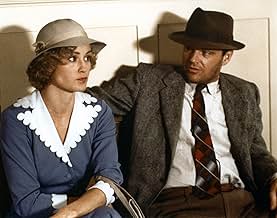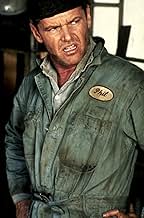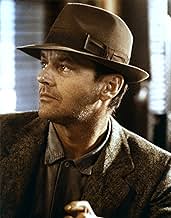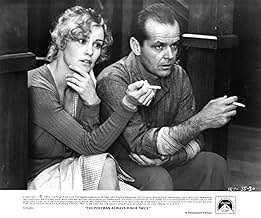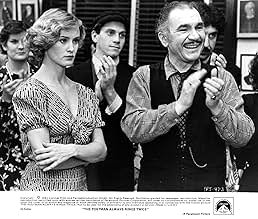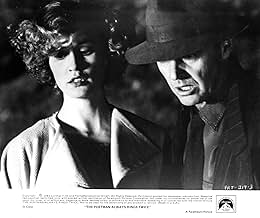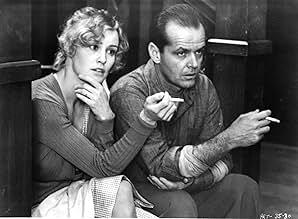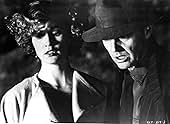AVALIAÇÃO DA IMDb
6,6/10
27 mil
SUA AVALIAÇÃO
A sensual esposa de um proprietário de lanchonete e um vagabundo sem raízes começam um caso sordidamente quente e conspiram para assassinar seu marido grego.A sensual esposa de um proprietário de lanchonete e um vagabundo sem raízes começam um caso sordidamente quente e conspiram para assassinar seu marido grego.A sensual esposa de um proprietário de lanchonete e um vagabundo sem raízes começam um caso sordidamente quente e conspiram para assassinar seu marido grego.
- Direção
- Roteiristas
- Artistas
- Prêmios
- 1 vitória e 2 indicações no total
Thomas Hill
- Barlow
- (as Tom Hill)
- Direção
- Roteiristas
- Elenco e equipe completos
- Produção, bilheteria e muito mais no IMDbPro
Avaliações em destaque
Twice is nice. Hollywood had to try twice to get this story right. Lana Turner was beautiful in the 1946 version, but Jessica Lange was something to kill for opposite Jack Nicholson.
Such raw sensuality would easily persuade a man to lose his very soul. Nicholson's part is certainly unscrupulous to begin with, but in Jessica Lange he finds a confederate with even less scruples. The legal loose ends that dangled in the earlier version are avoided this time with a more plausible chain of events... and the story ends when the story ought to end, instead of being dragged on.
Wonderful character and situation development, intriguing and engaging, even when you know the story. Nice twists of the story from the Lana Turner and Italian ("Ossessione" 1943) versions.
Such raw sensuality would easily persuade a man to lose his very soul. Nicholson's part is certainly unscrupulous to begin with, but in Jessica Lange he finds a confederate with even less scruples. The legal loose ends that dangled in the earlier version are avoided this time with a more plausible chain of events... and the story ends when the story ought to end, instead of being dragged on.
Wonderful character and situation development, intriguing and engaging, even when you know the story. Nice twists of the story from the Lana Turner and Italian ("Ossessione" 1943) versions.
This remake of the 1946 film which starred Lana Turner and John Garfield is significantly better than its reputation. The script, adapted from James M. Cain's first novel, is by the award-winning playwright David Mamet, while the interesting and focused cinematography is by Sven Nykvist, who did so much exquisite work for Swedish director Ingmar Bergman. An excellent cast is led by Jack Nicholson and Jessica Lange, whose cute animal magnetism is well displayed. Bob Rafelson, who has to his directorial credit the acclaimed Five Easy Pieces (1970) and The King of Marvin Gardens (1972), both also starring Jack Nicholson, captures the raw animal sex that made Cain's novel so appealing (and shocking) to a depression-era readership and brings it up to date. Hollywood movies have gotten more violent and scatological since 1981, but they haven't gotten any sexier. This phenomenon is in part due to fears occasioned by the rise of AIDS encouraged by the usual blue stocking people. Don't see this movie if sex offends you.
Lange is indeed sexy and more closely fits the part of a lower-middle class woman who married an older man, a café owner, for security than the stunning blonde bombshell Lana Turner, who was frankly a little too gorgeous for the part. John Colicos plays the café owner, Nick Papadakis, with clear fidelity to Cain's conception. In the 1946 production, the part was played by Cecil Kellaway, who was decidedly English; indeed they changed the character's name to Smith. Also changed in that production was the name of the lawyer Katz (to Keats). One wonders why. My guess is that in those days they were afraid of offending Greeks, on the one hand, and Jews on the other. Here Katz is played by Michael Lerner who really brings the character to life.
Jack Nicholson's interpretation of Cain's antihero, an ex-con who beat up on the hated railway dicks while chasing any skirt that came his way, the kind of guy who acts out his basic desires in an amoral, animalistic way, was not entirely convincing, perhaps because Nicholson seems a little too sophisticated for the part. Yet, his performance may be the sort better judged by a later generation. I have seen him in so many films that I don't feel I can trust my judgment. My sense is that he's done better work, particularly in the two films mentioned above and also in Chinatown (1974), One Flew Over the Cuckoo's Nest (1975) and such later works as The Shining (1980) and Terms of Endearment (1983).
The problem with bringing Postman successfully to the screen is two-fold. One, the underlying psychology, which so strongly appealed to Cain's depression-era readership, is not merely animalistic. More than that it reflects the economic conflict between the established haves, as represented by the greedy lawyers, the well-heeled insurance companies, the implacable court system and the simple-minded cops, and to a lesser degree by property owner Nick Papadakis himself, and the out of work victims of the depression, the have-nots, represented by Frank and Cora (who had to marry for security). Two--and this is where both cinematic productions failed--the film must be extremely fast-paced, almost exaggeratedly so, to properly capture the spirit and sense of the Cain novel. Frank and Cora are rushing headlong into tragedy and oblivion, and the pace of the film must reflect that. A true to the spirit adaptation would require a terse, stream-lined directorial style with an emphasis on blind passions unconsciously acted out, something novelist Cormac McCarthy might accomplish if he directed film. I think that Christopher Nolan, who directed the strikingly original Memento (2000) could do it.
For further background on the novel and some speculation on why it was called "The Postman Always Rings Twice" (Cain's original, apt title was "Bar-B-Que") see my review at Amazon.com.
(Note: Over 500 of my movie reviews are now available in my book "Cut to the Chaise Lounge or I Can't Believe I Swallowed the Remote!" Get it at Amazon!)
Lange is indeed sexy and more closely fits the part of a lower-middle class woman who married an older man, a café owner, for security than the stunning blonde bombshell Lana Turner, who was frankly a little too gorgeous for the part. John Colicos plays the café owner, Nick Papadakis, with clear fidelity to Cain's conception. In the 1946 production, the part was played by Cecil Kellaway, who was decidedly English; indeed they changed the character's name to Smith. Also changed in that production was the name of the lawyer Katz (to Keats). One wonders why. My guess is that in those days they were afraid of offending Greeks, on the one hand, and Jews on the other. Here Katz is played by Michael Lerner who really brings the character to life.
Jack Nicholson's interpretation of Cain's antihero, an ex-con who beat up on the hated railway dicks while chasing any skirt that came his way, the kind of guy who acts out his basic desires in an amoral, animalistic way, was not entirely convincing, perhaps because Nicholson seems a little too sophisticated for the part. Yet, his performance may be the sort better judged by a later generation. I have seen him in so many films that I don't feel I can trust my judgment. My sense is that he's done better work, particularly in the two films mentioned above and also in Chinatown (1974), One Flew Over the Cuckoo's Nest (1975) and such later works as The Shining (1980) and Terms of Endearment (1983).
The problem with bringing Postman successfully to the screen is two-fold. One, the underlying psychology, which so strongly appealed to Cain's depression-era readership, is not merely animalistic. More than that it reflects the economic conflict between the established haves, as represented by the greedy lawyers, the well-heeled insurance companies, the implacable court system and the simple-minded cops, and to a lesser degree by property owner Nick Papadakis himself, and the out of work victims of the depression, the have-nots, represented by Frank and Cora (who had to marry for security). Two--and this is where both cinematic productions failed--the film must be extremely fast-paced, almost exaggeratedly so, to properly capture the spirit and sense of the Cain novel. Frank and Cora are rushing headlong into tragedy and oblivion, and the pace of the film must reflect that. A true to the spirit adaptation would require a terse, stream-lined directorial style with an emphasis on blind passions unconsciously acted out, something novelist Cormac McCarthy might accomplish if he directed film. I think that Christopher Nolan, who directed the strikingly original Memento (2000) could do it.
For further background on the novel and some speculation on why it was called "The Postman Always Rings Twice" (Cain's original, apt title was "Bar-B-Que") see my review at Amazon.com.
(Note: Over 500 of my movie reviews are now available in my book "Cut to the Chaise Lounge or I Can't Believe I Swallowed the Remote!" Get it at Amazon!)
There are so many problems with this dull, listless filmization of the James M. Cain classic, where does one begin? Well, let's start from the beginning. It tries to compete with the great 1946 version. How do you top a film as brilliant as that? The answer is, you don't! Even if this new version does follow the original novel more closely, who cares? As the tragic, plotting lovers, Jessica Lange and Jack Nicholson have absolutely no chemistry whatsoever, so they generate very little heat in their allegedly steamy sex scenes. It's as if the filmmakers were so aware of the miscasting that they tried to disguise this by making the sex scenes between the duo more erotic, meaning more explicit. BIG MISTAKE! This just makes the lack of chemistry even more painfully obvious, and the sex scenes rather silly. Despite having virtually nothing in common, Nicholson and Lange can't keep their hands off of each other and do a lot of huffing and puffing. They go at it like two wild animals in heat, but this does little to make the film any more watchable or entertaining. Yes, Lange is even more breathtakingly beautiful than usual, and she brings more intensity and depth to the role than the script really required. But, whether she knows it or not, Nicholson is a constant thorn in her side. Sure, Jack is a great actor too, but, even though his character is a plotting murderer, there was a romantic edge to the role when John Garfield played it in 1946, and Nicholson does not have one bit of that romanticism. I still kringe when I think of him as the love interest in TERMS OF ENDEARMENT. How did he ever get to be cast in parts like that? Stay as clear from this as possible and settle only for the untoppable original.
A remake of the 1946 film, this version features Jack Nicholson and Jessica Lange, with a momentous white hot chemistry that can't possibly sustain itself but affords a memorable scene in the restaurant kitchen about ten minutes into the film which leads to the eventual plot to do in her older Greek husband. A story wherein neither would have the nerve to do such a thing alone, but together they make a job of it on one of the darkest nights and darkest rural roads ever. The trial for the murder features another couple of great performances by Michael Lerner as the resourceful to a fault defense attorney (if you were on trial for your life, you'd want this guy for a lawyer), and his investigator who becomes a menacing presence later in the film, played by John P Ryan. Very nicely photographed in color, it's set in the coastal hills and valleys north of LA, dotted with live oaks and capturing the rich earthy tones of the late afternoon golden hued hillsides that nicely contrast with the desperate story of the two lovers.
I must admit I was quite impressed with Bob Rafelson's adaptation of the depression era novel, "The Postman Always Rings Twice". Jack Nicholson plays Frank, a vagabond who eventually falls in love with a sexy waitress named Cora,played by Jessica Lange, who reciprocates this love. However, there is one problem standing in the way: Cora is married, unhappily married, but married nonetheless.
Aside from an intriguing story, "The Postman Always Rings Twice" is a wonderfully put together film, as Rafelson does a splendid job delving into the characters and their relationships, as well as examining the problems associated with forbidden love. As a viewer, you truly feel the passion between Lange and Nicholson,(who both won academy award nominations), and you almost feel for their pain. In the 1930's women in America were at quite a different position than they are today. They were expected to stay with the husband no matter what the circumstances, as divorce was quite uncommon. Lange was very convincing as this trapped 30's woman who eventually broke free the only way she knew possible..
I definitely recommend "The Postman Always Rings Twice" for any fan of entertaining and thought-provoking movies. Although the character development is not quite as extensive as some of Rafelson's early work, particularly the 1971 classic "Five Easy Pieces", the movie combines an intriguing screenplay with superb acting to make its own statement.
Aside from an intriguing story, "The Postman Always Rings Twice" is a wonderfully put together film, as Rafelson does a splendid job delving into the characters and their relationships, as well as examining the problems associated with forbidden love. As a viewer, you truly feel the passion between Lange and Nicholson,(who both won academy award nominations), and you almost feel for their pain. In the 1930's women in America were at quite a different position than they are today. They were expected to stay with the husband no matter what the circumstances, as divorce was quite uncommon. Lange was very convincing as this trapped 30's woman who eventually broke free the only way she knew possible..
I definitely recommend "The Postman Always Rings Twice" for any fan of entertaining and thought-provoking movies. Although the character development is not quite as extensive as some of Rafelson's early work, particularly the 1971 classic "Five Easy Pieces", the movie combines an intriguing screenplay with superb acting to make its own statement.
Você sabia?
- CuriosidadesDavid Mamet's first screenplay.
- Erros de gravaçãoModern-day paper currency is used in craps game set during Great Depression, instead of silver certificate dollar bills then in use.
- Citações
Cora: I gotta have you, Frank. If it was just us. If it was just you and me.
Frank Chambers: What are you talking about?
Cora: I'm getting tired of what's right and wrong.
Frank Chambers: They hang people for that, Cora.
- Versões alternativasCBS edited 30 minutes from this film for its 1986 network television premiere.
- ConexõesEdited into American Cinema: Film Noir (1995)
Principais escolhas
Faça login para avaliar e ver a lista de recomendações personalizadas
- How long is The Postman Always Rings Twice?Fornecido pela Alexa
Detalhes
- Data de lançamento
- Países de origem
- Idiomas
- Também conhecido como
- El cartero siempre llama dos veces
- Locações de filme
- Barnsdall Rio Grande Service Station, Goleta, Califórnia, EUA(Cora and a Drunk Nick and Frank get Fuel)
- Empresas de produção
- Consulte mais créditos da empresa na IMDbPro
Bilheteria
- Orçamento
- US$ 12.000.000 (estimativa)
- Faturamento bruto nos EUA e Canadá
- US$ 12.376.625
- Faturamento bruto mundial
- US$ 12.383.416
Contribua para esta página
Sugerir uma alteração ou adicionar conteúdo ausente


